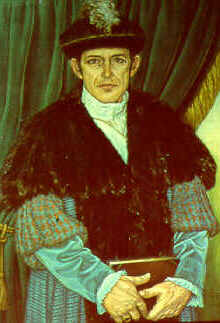|
restoring our biblical and constitutional foundations
|
Seven Who Changed the World
In sixteenth century Switzerland a renewal movement was launched that would change the face of the church forever. Anabaptism was born, and with it the beginning of the modern "free" church movement.
A group of young radicals, disciples of Ulrich Zwingli, insisted that, as far as believer's baptism was concerned, no compromise with the Word of God would be tolerated. Conrad Grebel (pictured below) emerged as its leader and spokesman. By the end of the year 1523, their number would total seven. In addition to Grebel there were Andress Castelberg, Felix Manz, Heinrich Aberli, Joannes Panicellus, Hanns Oggenfuss, and Hanns Huiuf.

What was it that set these bold pioneers apart from their erstwhile leaders, including Zwingli? Above all it was their concern to follow Scripture. As Grebel put it, "We were listeners to Zwingli's sermons and readers of his writings, but one day we took the Bible itself in hand and were taught better" (Blanke, Brothers in Christ, p. 14).
Nothing demonstrates more vividly the clear distinction between the Magisterial Reformers (such as Zwingli) and the Anabaptist "radicals." Both groups affirmed sola scriptura. But what does that mean in practical terms? It means being obedient to the simple commands of Christ. It means holding our traditions up to the pure light of the Bible. It means being willing to go against the grain of accepted thinking when the Word of God requires it.
We need a refresher course today in church history to straighten out our inadequate view of the Reformation. It might be distressing but it would reveal the need to say, along with the Seven, "Once we were listeners and readers of men's writings, but now we take the Bible in hand and are taught better."
The kingdom of God is no place for people whose faces are pointed in one direction and their feet in another. Students, may I challenge you to ask yourselves whether or not you belong to a radical minority whose greatest concern is to be followers of Jesus in simple obedience? Please listen to me. It is possible to enjoy justifying grace and to stand in uncompromising orthodoxy without walking as Jesus walked. One sure mark of revival is that it weans people from the words of men (including mine!). Without a firm commitment to the Word of God we are nothing but shorn Samuels on a treadmill.
The men and women of the Swiss Anabaptist Movement were set on fire by the Scriptures. They refused to dodge issues or to be diverted by politics. Neither did they wash their hands of the world's troubles by piously saying, "I am of Christ." Their aim in all they did was firstly to have God's approval, and then to act in such a way that when their methods were examined by others they had no need to be ashamed.
Students, the church today needs its Scriptural Seven, its Conrad Grebels and its Felix Manzes. To fail in our fidelity to Scripture is to fail completely in our witness to the world. As someone once put it, "Is your life a Bible or a libel?" I urge you to say with the Anabaptists of old, "Our devotion to the Word of God takes precedence over our loyalty to any word of man!"
August 29, 2010
David Alan Black is the editor of www.daveblackonline.com.